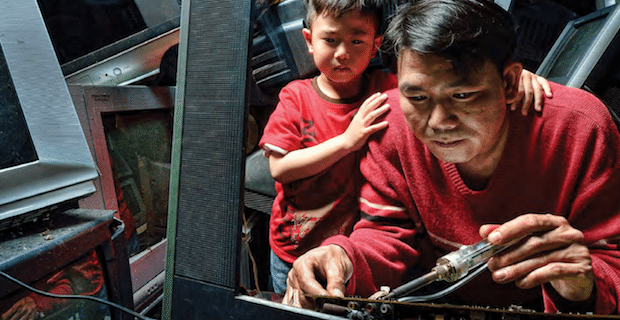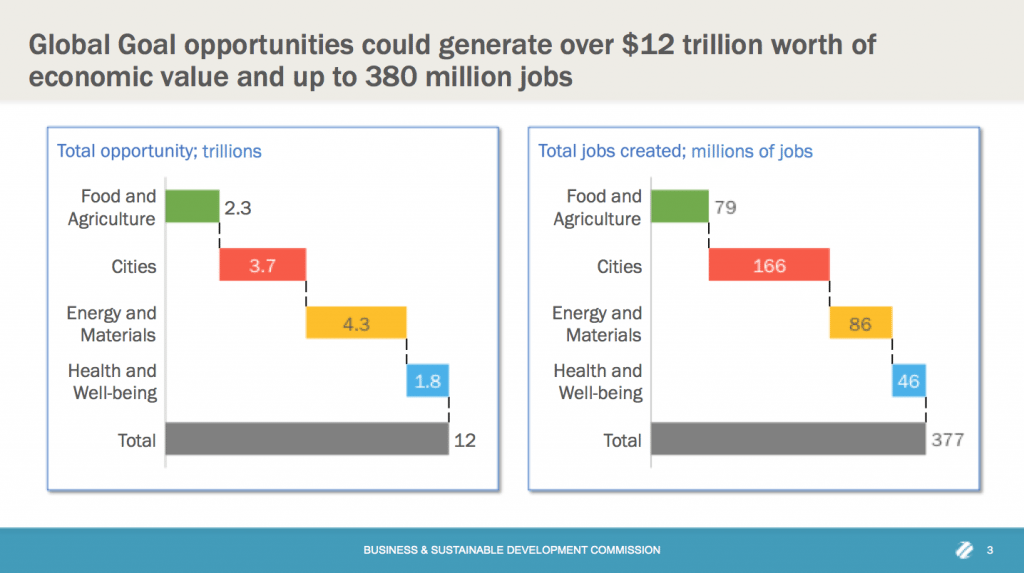
By Jeremy Oppenheim, Programme Director, Business & Sustainable Development Commission
2015 was a year filled with positive achievements for our collective future, with the adoption of both the UN Sustainable Development Goals (SDGs) and the Paris Agreement. 2016 came as a stark contrast to 2015. Our assumptions about the global economy were shaken, with many asking whether the costs of globalization are greater than its benefits.
Throughout last year, the Business and Sustainable Development Commission set out to make a strong business case for sustainable development, and provide a pathway to a more inclusive and just economy. The conclusion of the Commission’s flagship report, Better Business, Better World, is unequivocal: SDGs, also called the Global Goals, offer a compelling growth strategy for the world economy.
While the SDGs need business to seize market opportunities and advance progress on the whole Global Goals package, business needs SDGs. The report provides the arguments, case studies and data which — perhaps for the first time — convincingly illustrate the many benefits to business of the SDGs:
- An economic prize of up to US$12 trillion by 2030 for the private sector, which could reach $30 trillion through even broader Global Goal opportunities
- 60 “hotspots” opportunities in the four economic systems reviewed by the Commission – food and agriculture, cities, energy and materials, and health and well-being – which generate business revenue & savings equal to 10% of forecast global GDP. These 60 Global Goals hotspots can grow 2-3 times faster than the global economy.
- 380 million jobs created by Global Goal business opportunities [in the four systems] by 2030
- Pricing in environmental costs such as climate change increases the “real” size of the prize by a further 40 percent.

How do these 60 hotspots translate into real opportunities? Dozens of case studies reviewed in the Commission’s report illustrate how pioneering businesses are already reaping the benefits from SDG-compatible initiatives. Consider the following examples:
- Affordable housing is the single biggest market hotspot identified by the Business Commission, accounting for the creation of 70 million jobs and up to $1 trillion in market value by 2030.
- The Saudi company, Red Sea Affordable Housing (RSAH), part of the Al Dabbagh Group, was set up on the premise that building affordable housing is a chance both to make money and satisfy a profound social need. In addition to the domestic market, the company is looking further afield in regions where there is a significant gap in affordable housing, sized at about US$650 billion.
- Circular models in the automotive industry are estimated to be worth US$475-810 billion. 12 million vehicles could be taken off the roads every year in the EU – 12 tonnes per car of valuable resource.2
- Renault’s remanufacturing plant at Choisy le Roi is testament to the benefits of car remanufacturing: it is the group’s most profitable industrial site – it reuses 43% of carcasses and recycles 48% of materials in foundries to produce new parts.
- Reducing food waste in the value chain is estimated to be worth $155-405 billion a year by 2030. Today, 20-30% of food is wasted, much of it in post-harvest losses that are easy to prevent with technologies like small metal silos or plastic crates.
- In India and Rwanda, such technologies have reduced losses by over 60% – and increased smallholder farmers’ incomes by more than 30%.
We must be realistic — in order for these great ideas to develop and thrive, a good disruption must take place. It will require a set of conditions: breakthrough technology — such as digital platforms, smart regulation, forward-looking policies and innovative financing tools. If the right conditions are met, this new blueprint for business will be able to reach its full potential.
We are calling upon business leaders to join the Better Business, Better World agenda. The Commission will be carrying out ground-breaking work throughout 2017: we will drive market transformation with an initial focus on the new food and land-use economy, initiate a task force on blended finance and create a new sustainability benchmarking program.
Our ambition for the coming year is to catalyse a new group of enlightened CEOs who are convinced that sustainable development belongs at the heart of their value creation strategies. By joining our movement, business leaders have the opportunity to participate in some of these breakthrough initiatives and have access to support from the Commission in developing your own SDG agenda.
Here’s what you could do:
- Read the Better Business report and agree to be cited as “supporting the main thrust of the Commission’s recommendations.”
- Hold a board session on how to mainstream the SDGs to drive growth, improve productivity and lower risks.
- Establish and publish targets that commit your company to transforming its social and environmental footprint in line with the most relevant SDGs.
- Commit to a leadership programme that makes “purpose” and leading for sustainable outcomes central to professional advancement.
- Link executive compensation meaningfully to SDG-related corporate performance.
- Review key policy and regulatory positions to ensure that they support SDG delivery.
One view of the future is of ever-deepening tension between business and society. A different view is one where business is at the very heart of solving society’s toughest challenges — and makes good returns when doing so. That is the vision which the Business Commission holds — with the SDGs providing the compass for the next generation of purpose-driven economic growth. That is the vision that individually and together, we need to translate into practice.
Visit the Business Commission website
Email us at take-action@businesscommission.org
____________
The Commission is keen to support all leaders who wish to go further on their sustainability journey and take a leading role in the implementation of SDGs.
Please get in touch, we’d love to hear from you and can offer suggestions for further action.

Jeremy spent 20 years at McKinsey, developing and leading its Sustainability and Resource Productivity Practice from 2007-2015. He is a founding partner of SystemiQ, a new firm dedicated to building sustainable, market-based economies, programme director of the Energy Transitions Commission, lead author of the Better Growth, Better Climate report of the New Climate Economy project, and advisor to multiple governments, companies and foundations on system transformation and resource productivity.
